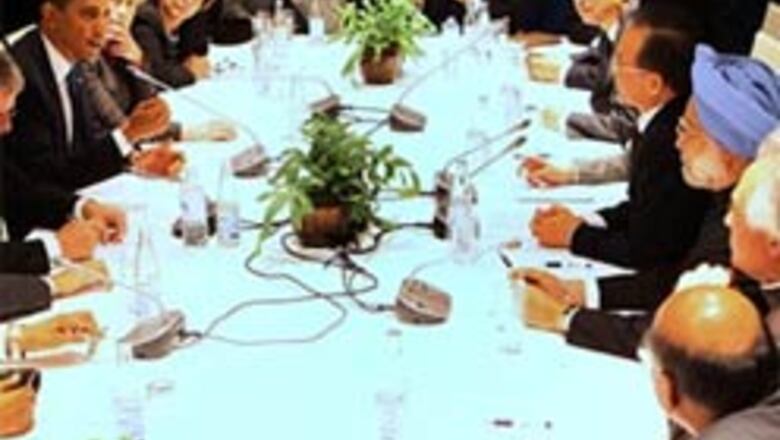
views
Copenhagen: The world summit on climate change went down to the wire on Friday night with negotiators guided by heads of government making vigorous attempts to come out with a deal on fighting the challenge of global warming.
Prime Minister Manmohan Singh, who was scheduled to leave the Danish capital by early Friday evening, was back at the conference venue like President Barack Obama delaying their return home.
They altered their travel plans as UN Secretary General Ban ki-Moon gave a call to world leaders to defer their departures by a day.
Late in the day emerged a fresh draft that spoke of bringing back the December 2010 deadline for hammering out a legally binding treaty on fighting global warming. But countries like India and China were pushing for continuation of the Kyoto Protocol that obliges developed countries to take major emission cuts within a time-frame.
It is understood that the Australians, the French and the Danish have sought a review of whole process in 2016, which effectively would amount to killing the Protocol.
Addressing the high-level segment of the summit, Singh said the Kyoto Protocol should continue to stand as a valid legal instrument. Parties to the Protocol should deliver on their solemn commitments under it, he said.
"It would go against international public opinion if we acquiesce in its replacement by a new and weaker set of commitments," he said.
However, Singh was frank enough not to place too much hopes when he said the outcome of the summit may well fall short of expectations.
Back at the conference venue, the Prime Minister went into a huddle with leaders of Brazil, South Africa and China, who form the BASIC group, for working out a strategy before going to the plenary.
There were indications that Prime Minister's Special Envoy on Climate Change Shyam Saran could stay behind in case negotiations drag on.
President Obama was involved in hectic talks and had two meetings with Chinese Premier Wen Jiabao during the day.
Amid receding hopes of a substantive and comprehensive deal, some countries were seeking at least a political document spelling out commitments on emission cuts as well as financing and technology transfer to developing nations.
India and other developing countries were pushing for clear cut legally binding assurances by the developed world on reducing greenhouse gases substantially within a time-frame which should not be far away.
They maintain that since developed countries are the major polluters of environment, they must share the major burden in mitigating the impact of climate change.
The developing nations are also pressing for substantive funding from rich nations that should be separately earmarked and not come in the form of overseas development assistance or loans.
Some of the drafts in circulation spoke about industrialised countries cutting their greenhouse emissions by at least 80 per cent by 2050.
Some drafts also favoured a legally binding treaty within six months or no later than December 2010.
Pushing negotiators to reach a deal, the UN chief said "the finishing line is in sight" and reminded them that "the world is watching."
In his speech, Singh pointed out that the vast majority of countries do not support any renegotiation or dilution of the principles of the UNFCCC, in particular of equity and common but differentiated responsibilities and respective capabilities.
"To settle for something that would be seen as diminished expectations and diminished implementation would be the wrong message to emerge from this Conference."
"We should therefore reaffirm categorically that our negotiations will continue on the basis of the Bali mandate," the Prime Minister said.
Making it clear that the developed world had a major responsibility to tackle climate change, Wen said developing countries only started industrialisation a few decades ago and it is "totally unjustified" to ask them to undertake emission reduction targets beyond their obligations and capabilities in disregard of historical responsibilities.
Echoing views of Indian and Chinese sides, Brazilian President Luiz Inacio Lula da Silva said the process of monitoring, reporting and verification cannot threaten national sovereignty of any country.
Obama said world leaders should accept a global climate change deal, even if it is "imperfect" and pitched for "transparency" and sharing of information on national actions taken by countries.




















Comments
0 comment